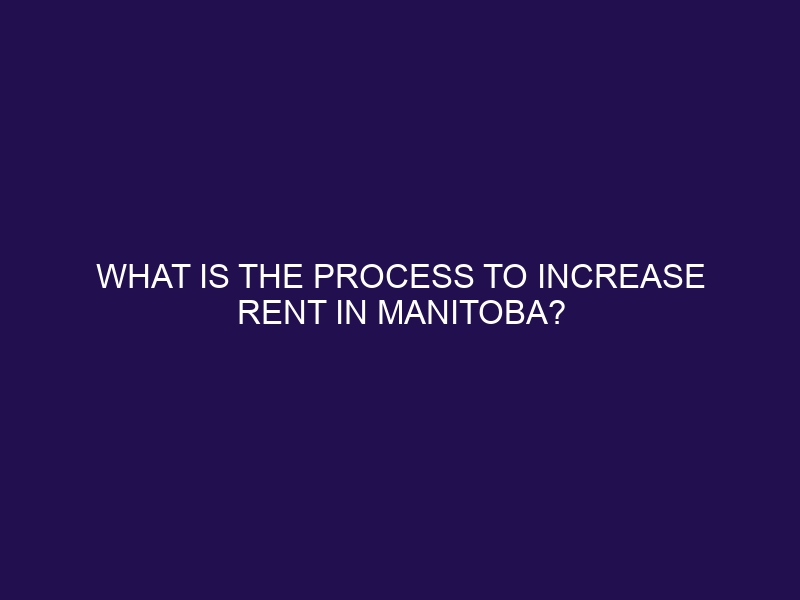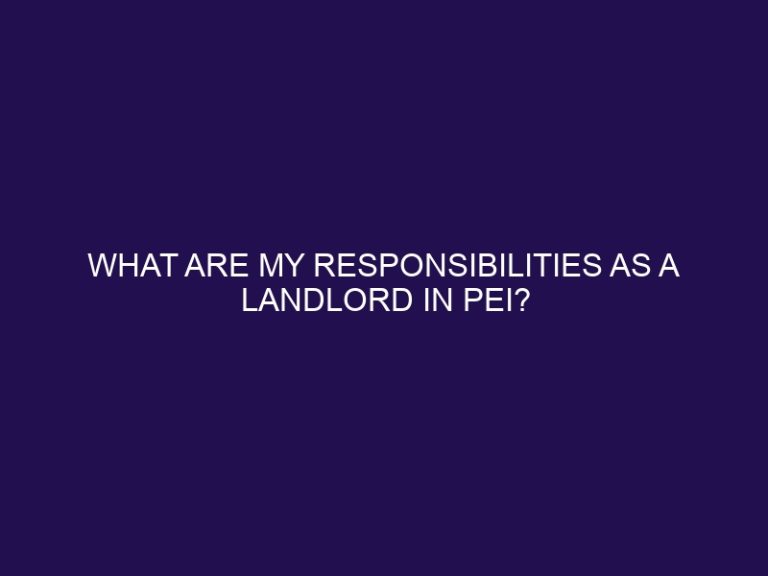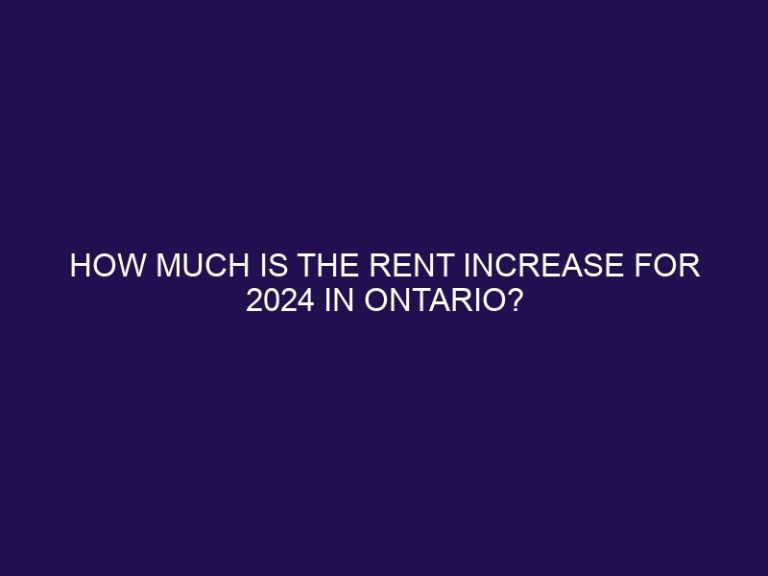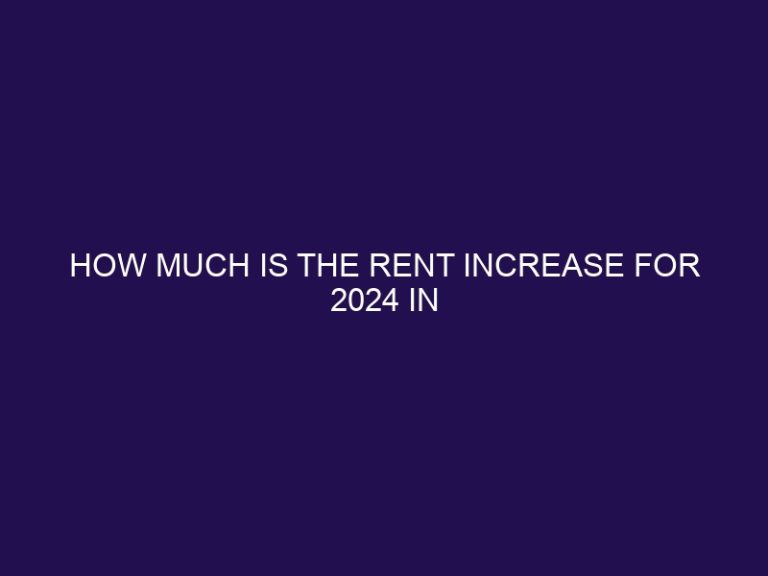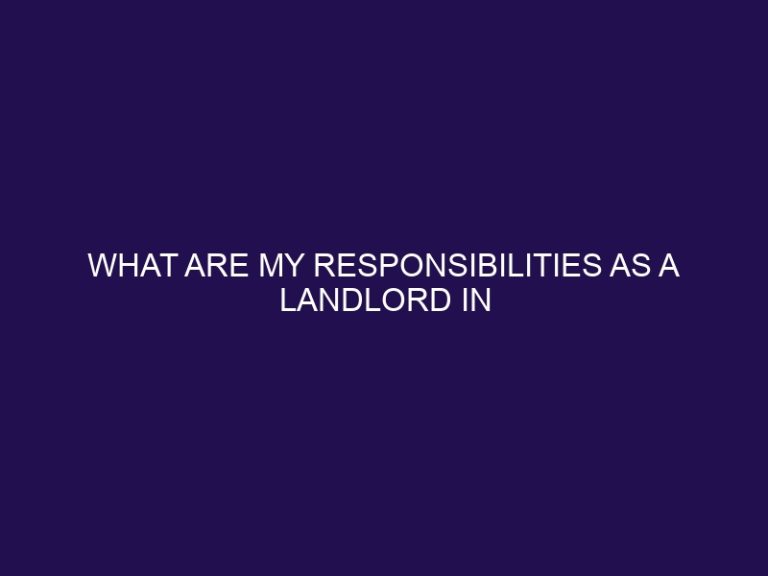What is the process to increase rent in Manitoba?
.jpg)
Rent increases can often be a complex and sensitive issue for both landlords and tenants. In Manitoba, there are legal guidelines and processes that must be followed when increasing rent. Understanding these guidelines is crucial to ensure compliance with the law and maintain a fair and transparent rental relationship. This article will provide an overview of the process to increase rent in Manitoba and the legal guidelines that govern rent increases in the province. it will offer tips and best practices for landlords to navigate this process effectively. By following the correct procedures and adhering to the applicable laws, landlords can increase rent in a fair and lawful manner while maintaining a positive landlord-tenant relationship.
Key takeaways:
- Understanding rent increase laws: Landlords in Manitoba must follow legal guidelines and notice requirements when increasing rent, including determining the applicable rent increase guideline and preparing the rent increase notice.
- Serving the rent increase notice: Landlords should serve the rent increase notice to the tenant, allowing the tenant to respond and negotiate. If disputes arise, landlords can apply for dispute resolution.
- Tips for rent increases: Clear communication with tenants, keeping accurate records, and seeking legal advice when uncertain are important practices for landlords when increasing rent in Manitoba.
Legal Guidelines for Rent Increases
When considering a rent increase in Manitoba, it is crucial for landlords to abide by legal guidelines to ensure a fair and lawful process. Here are some key points to keep in mind regarding the legal guidelines for rent increases:
1. Notice: Landlords must provide tenants with written notice of the rent increase, ensuring that the notice period is at least 3 months prior to the increase taking effect.
2. Limits on Increases: Rent increases are subject to annual limits set by the Residential Tenancies Branch to maintain fairness. For 2021, the maximum allowable increase is 1.6%.
3. Proper Documentation: To adhere to the legal guidelines, landlords should document the rent increase in writing, clearly stating the effective date and the new rental amount.
4. Tenant Rights: Tenants have the right to dispute a rent increase if they believe it to be unlawful or unreasonable. In such cases, they can seek assistance from the Residential Tenancies Branch for further guidance and support.
In a recent case in Manitoba, a landlord unlawfully increased the tenant’s rent by a significant amount without providing proper notice. The tenant, aware of their rights, immediately sought advice from the Residential Tenancies Branch. Through negotiation and within the limits established by the legal guidelines for rent increase, both parties were able to reach a fair outcome that ensured the tenant’s rights were protected and maintained.
What are the Rent Increase Laws in Manitoba?
What are the Rent Increase Laws in Manitoba?
In Manitoba, it is crucial for landlords to be aware of the rent increase laws to ensure compliance.
To navigate the process smoothly, it is important to know what the rent increase laws in Manitoba entail.
These laws include understanding the notice requirements, any maximum limits, and the exceptions to the laws.
To increase rent, landlords must review the rental agreement, determine the applicable rent increase guideline, prepare the rent increase notice, and serve it to the tenant.
To follow best practices, communication with the tenant, keeping accurate records, and seeking legal advice if needed are important.
By knowing the rent increase laws in Manitoba, landlords can effectively navigate the process.
What are the Notice Requirements for Rent Increases?
What are the Notice Requirements for Rent Increases?
In Manitoba, landlords must adhere to specific notice requirements when increasing rent. These notice requirements ensure that tenants are informed and have sufficient time to consider the increase. The notice must be provided in writing and clearly state the new amount, the effective date, and the reason for the increase. It is recommended by the Residential Tenancies Branch to give tenants at least three full rental periods notice before implementing the increase. Failure to follow these notice requirements may result in the rent increase being deemed invalid. Therefore, landlords must familiarize themselves with and adhere to the notice requirements set forth by the Residential Tenancies Act.
Is there a Maximum Limit for Rent Increases?
Is there a Maximum Limit for Rent Increases?
In Manitoba, the residential tenancies branch has set a maximum increase limit for rent. This limit is determined by the annual rent increase guideline. The guideline takes into account the average percentage change in the Consumer Price Index. For the year 2021, the maximum increase allowed is 2.4%. Landlords are required to follow this guideline, unless they have an approved application for an additional increase due to specific circumstances. To avoid legal issues and potential disputes with tenants, it is crucial for landlords to carefully review the current guidelines and ensure that any rent increase notices fall within the permissible limit.
Are there any Exceptions to Rent Increase Laws?
Yes, there are exceptions to rent increase laws in Manitoba. Landlords are not permitted to increase the rent more than once in a 12-month period, unless there has been a significant change in operating costs. Certain rental units are exempt from rent increase guidelines, such as new units constructed after 1991 or social housing units. Landlords must be cautious and familiarize themselves with the specific regulations and guidelines to ensure compliance and avoid any potential legal disputes.
Are there any Exceptions to Rent Increase Laws?
In an apartment building in Manitoba, the landlord discovered a major plumbing issue that required extensive repairs. Due to the significant increase in operating costs, the landlord applied for an exception to increase the rent for all affected units. The application was approved, and the increased rent allowed for the necessary repairs to be completed promptly, ensuring the tenants’ comfort and safety.
The Process to Increase Rent in Manitoba
Looking to increase rent in Manitoba? Wondering what the process entails? In this section, we’ll walk you through each step, ensuring you have a clear understanding of the process. From reviewing the rental agreement to preparing the rent increase notice, serving it to the tenant, and handling their response and negotiation, all the way to the application for dispute resolution and implementing the approved rent increase. Stay tuned as we break it down for you!
Step 1: Review the Rental Agreement
Reviewing the rental agreement is the first step in the process of increasing rent in Manitoba.
- Understand the terms: Carefully read and understand the terms and conditions of the rental agreement.
- Check for expiration dates: Determine if the rental agreement has an expiry date or if it is on a month-to-month basis.
- Look for rent increase clauses: Check if the rental agreement includes clauses regarding rent increases and the process to follow.
- Consider rent increase guidelines: Familiarize yourself with the guidelines set by the Residential Tenancies Branch regarding rent increases.
- Consult the landlord: If you have any doubts or questions, reach out to the landlord or property manager for clarification.
In 2019, Manitoba implemented new legislation to protect tenants and regulate rent increases. This was in response to increasing rental costs and the need for fair and transparent processes in the rental market.
Step 2: Determine the Applicable Rent Increase Guideline
Step 2: Determine the Applicable Rent Increase Guideline
Step 3: Prepare the Rent Increase Notice
- Review the rental agreement to confirm if a rent increase is allowed and the notice period required.
- Determine the applicable rent increase guideline set by the government for the current year.
- Prepare the Rent Increase Notice, including the new rent amount, effective date, and reasons for the increase.
- Serve the rent increase notice to the tenant personally or through registered mail to ensure proper delivery.
- Allow the tenant to respond and negotiate if they have concerns or objections to the rent increase.
- If an agreement cannot be reached, either party can apply for dispute resolution through a government-approved process.
- Once the rent increase is approved, implement the new rent amount as per the notice.
Step 4: Serve the Rent Increase Notice to the Tenant
Serving the rent increase notice to the tenant is an important step in the process to increase rent in Manitoba. Here is a list of steps involved in serving the notice:
- Prepare the rent increase notice with all the required information, including the date, the amount of the increase, and the effective date.
- Ensure that the notice is served to the tenant by using an acceptable method, such as registered mail, hand delivery, or email (if agreed upon).
- Keep a copy of the notice for your records, along with proof of delivery if applicable.
- Allow the tenant the required amount of notice, which is generally 3 months in Manitoba.
- Serve the Rent Increase Notice to the Tenant.
By following these steps, you can serve the rent increase notice to the tenant in a proper and legal manner.
Step 5: Tenant’s Response and Negotiation
“`
- Step 5: Tenant’s Response and Negotiation
After receiving the rent increase notice, the tenant has the opportunity to respond and negotiate with the landlord. Here are the steps involved in this process:
- Review the notice: The tenant should carefully review the details of the rent increase notice, including the proposed amount and effective date.
- Evaluate affordability: The tenant should assess whether the proposed increase is affordable within their budget.
- Communicate concerns: If the tenant has concerns about the rent increase, they should communicate them to the landlord, providing reasons and supporting evidence if applicable.
- Negotiate: The tenant and landlord can engage in negotiation to find a mutual agreement on the rent increase. This may involve discussing alternative options or proposals.
- Document negotiations: It is important for both parties to keep a record of all communication and negotiations regarding the rent increase.
Fact: In Manitoba, if the tenant believes the proposed rent increase is unreasonable, they can apply for dispute resolution through the Residential Tenancies Branch.
Step 6: Application for Dispute Resolution
- Gather all relevant documents and evidence related to the rent increase dispute.
- Research the specific dispute resolution process in Manitoba, including any necessary forms or applications.
- Complete and submit the application for dispute resolution, providing all required information and supporting documents.
- Pay any necessary fees or deposits associated with the application.
- Attend any scheduled hearings or meetings related to the dispute resolution process.
- Present your case and provide evidence to support your position during the dispute resolution proceedings.
- Comply with any decisions or resolutions reached during the dispute resolution process.
- Keep records of all interactions and communications related to the dispute resolution process.
- If necessary, seek legal advice or assistance to navigate the dispute resolution process.
- Application for Dispute Resolution: Submit the completed application form, along with any required documents and fees.
Step 7: Implementing the Approved Rent Increase
-
Review the rent increase approval notice received from the Residential Tenancies Branch.
-
Update the tenant’s rental agreement to reflect the new rent amount and any other changes.
-
Prepare a written notice of rent increase, including the effective date and the new rent amount.
-
Serve the notice to the tenant at least three rental months before the intended increase date.
-
Keep a copy of the notice and proof of delivery for your records.
-
Allow the tenant the opportunity to negotiate or discuss the increase if they wish to do so.
-
Step 7: Implementing the Approved Rent Increase
-
Once the effective date arrives, start collecting the increased rent amount as stated in the notice.
One landlord, John, went through this process after receiving approval for a rent increase. He ensured clear communication with his tenant, provided accurate documentation, and implemented the increase smoothly.
Tips and Best Practices for Rent Increases
When it comes to increasing rent in Manitoba, it’s important to approach it with knowledge and skill. In this section, we’ll explore some tips and best practices that can guide you in navigating this process successfully. From effectively communicating with your tenants to keeping meticulous records, we’ll discuss how to handle rent increases with clarity and professionalism. We’ll touch on the importance of seeking legal advice if you find yourself unsure or in need of guidance. Get ready to master the art of rent increases in Manitoba!
Communicating Clearly with the Tenant
Effectively communicating with tenants is crucial when increasing rent in Manitoba.
Here are some steps to ensure clear communication:
- Notify the tenant in writing of the upcoming rent increase, clearly stating the new amount and effective date.
- Explain the reasons for the increase, such as rising expenses or property improvements, to help tenants understand the decision.
- Be open to discussing the increase with tenants and addressing any concerns or questions they may have.
- Provide clear channels of communication, such as email or phone, to ensure tenants can easily reach out to you.
Pro-tip: Maintaining transparent and respectful communication with your tenants can help foster a positive landlord-tenant relationship and mitigate potential conflicts.
Keeping Accurate Records
To ensure a smooth and organized process for rent increases in Manitoba, it is essential to prioritize keeping accurate records. Here are several steps that can assist you in maintaining proper documentation while managing rent increases:
1. Record the date and details of the rent increase notice, including the specific amount or percentage. By documenting this information, you have a clear record of the rent adjustment.
2. Ensure you keep copies of all correspondence exchanged between you and the tenant concerning the rent increase. These records are pivotal in demonstrating effective communication.
3. It is crucial to maintain a record of any negotiations or agreements that occur during the process of rent increases. This documentation helps in keeping track of the progress made.
4. Document any changes made to the rental agreement or lease terms resulting from the rent increase. By recording these modifications, you have a comprehensive overview of the updated terms.
5. Keep track of rent payment receipts and any other relevant financial records. This encompasses all financial documentation, contributing to accurate record-keeping.
By adhering to these steps and keeping accurate records, you can easily refer back to essential information whenever necessary. Additionally, maintaining thorough documentation helps safeguard against potential disputes or misunderstandings that may arise.
Seeking Legal Advice if Uncertain
Seeking legal advice if uncertain is always a wise decision to make in any legal matter. When uncertain about the rent increase process in Manitoba, it is crucial to seek legal advice. A lawyer specializing in landlord-tenant law can provide guidance on legal requirements, helping landlords avoid potential disputes and legal complications. They can clarify any doubts related to notice requirements, maximum limits, exceptions, and dispute resolution procedures. By seeking legal advice if uncertain, landlords can ensure they are following the correct procedures and protecting their rights, while also maintaining positive relationships with tenants. Remember, seeking legal advice if uncertain is always a wise decision to make in any legal matter.
Some Facts About the Process to Increase Rent in Manitoba:
- ✅ The Residential Tenancies Act requires landlords to provide three months’ notice for a rent increase.
- ✅ Rent increases must comply with the rent increase guideline set by the Residential Tenancies Branch.
- ✅ The rent increase guideline for 2024 in Manitoba is three percent, effective January 1, 2024.
- ✅ Landlords can apply for above-guideline increases, which are not subject to the rent increase guideline.
- ✅ Buildings less than 20 years old, owned by a government agency, or renting for $1,615.00 or more per month are exempt from the rent increase guideline and can increase rent by market value once per year.
Frequently Asked Questions
What is the process for increasing rent in Manitoba?
According to the Residential Tenancies Act in Manitoba, landlords are required to provide three months’ notice of a rent increase. The process begins with the landlord issuing a written notice to the tenant, clearly stating the new rental amount and the effective date of the increase. It is essential for landlords to follow the proper procedures outlined in the Act when implementing a rent increase.
Are there any rent increase guidelines in Manitoba?
Yes, Manitoba has rent increase guidelines that landlords must adhere to. For the years 2022 and 2023, the annual rent increase guideline was set at zero percent. However, starting from January 1, 2024, the rent increase guideline will be three percent. Landlords can only increase the rent within these guidelines, unless they apply for an above-guideline increase.
Can landlords increase the rent above the maximum permitted by the regulations?
No, landlords are not allowed to increase the rent above the maximum permitted by the regulations, as stated in sections 123 to 124 of the Residential Tenancies Act. Any rent increases exceeding the maximum limit would be considered a violation of the Act. Tenants have the right to challenge such increases and seek resolution through the appropriate channels.
Are there any exemptions to the rent increase guidelines in Manitoba?
Yes, there are certain exemptions to the rent increase guidelines in Manitoba. Buildings that are less than 20 years old, owned by a government agency, or rent for $1,615.00 or more per month are exempt from the guideline. In such cases, landlords can increase the rent by market value once per year, regardless of the rent increase guideline set for that year.
What is the process if a landlord wants to regain possession of the property and increase the rent?
If a landlord wants to regain possession of the property and increase the rent, they need to follow the procedures outlined in sections 131 to 132 of the Residential Tenancies Act. These sections provide guidance on the necessary steps and requirements for landlords in such situations. It is important for landlords to understand their obligations and adhere to the legal process to ensure a fair and lawful rent increase.
What can tenants do if they believe a rent increase is being used as a means to evict them?
If tenants believe that a rent increase is being used as a means to evict them, they have the right to challenge the increase. However, the process can be lengthy and offers no guarantee of a decision in their favor. It is recommended for tenants to seek legal advice or assistance from organizations such as the West Broadway Tenants Committee to understand their rights and explore options for resolution.

